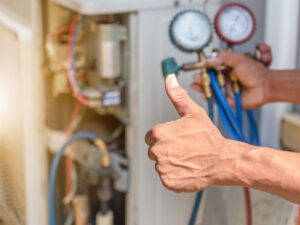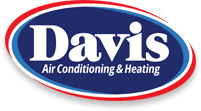What Could Cause Your Air Conditioner to Leak Water?
Air conditioning leaks can be frustrating. Not only are they messy, but they can potentially cause significant water damage to your home. In fact, these “small” inconveniences can sometimes lead to big problems.
Common Causes of AC Water Leakage
The following issues can cause water leaks in your central AC system:
Clogged Drain Line
A clogged condensate drain pipe can make your AC system’s drain pan overflow. This is probably the most frequent cause of water leakage from a central AC system, bringing many service calls to HVAC professionals as summer temperatures rise. Drain lines can become clogged with dirt, rust, algae and other debris.
Disconnected Drain Line
When AC systems are improperly installed drain pipe fittings may not be secure. Over time, they can loosen, causing the drain pipe to disconnect from the AC unit and allowing the condensate to drain through the ceiling or onto the floor. As with a clogged drain line, the location of the leak will depend on whether the primary or secondary drain pipe is the one affected and whether your central AC system is located in the attic or in your house.
Condensate Pump Problems
A malfunctioning or dirty condensate pump can also cause water leakage from your AC system, flooding your attic or basement. Due to the continual presence of water, mold and mildew can grow inside the unit, causing it to clog.
Other Potential Causes of AC Water Leakage
Water leaks can also be caused by the following issues:
- Clogged air filter
- Low refrigerant
- Cracked condensate drain pan
- No p-trap and air vent in the drain line to prevent water backup
- Condensate buildup in un-insulated ductwork
The first two issues in the list above can contribute to a frozen evaporator coil, which creates its own set of water leakage problems.
Ways to Avoid Damage from Water Leakage
Follow these tips to reduce the likelihood of water leakage issues:
- Make sure your central AC system has a secondary drain line — especially if your air handler is in the attic.
- Install a drain pan overflow shutoff switch, equipped with a float.
- Add a safety pan under your AC unit to catch drain pan overflow.
- Clean or change your HVAC air filter regularly.
- Make sure your ductwork is properly insulated.
- Have your AC refrigerant levels checked regularly.
- Make sure each drain line contains a p-trap and air vent.
- Keep your condensate pump free from mold and mildew by flushing it with a 50% bleach/water solution.
- Schedule annual HVAC maintenance to maximize performance and minimize furnace and AC repairs.
Note: When you notice what appears to be water leaking from your AC system, it’s important to verify with your HVAC professional that it is in fact water and not refrigerant, since a refrigerant leak is a far more serious problem.
Call Davis Air Conditioning & Heating for Top-Notch Air Conditioner Service
When you experience water leakage problems or other issues that may potentially require AC repairs in Houston Texas, call Davis Air Conditioning & Heating. Our NATE-certified technicians provide top-quality HVAC services throughout Greater Houston.
You May Also Like

Is My Heat Pump in Fort Bend, TX, Low On Refrigerant?
Your heat pump hums through the cool January mornings in Fort Bend, TX, but something feels off. The air trickling from your… Continue Reading Is My Heat Pump in Fort Bend, TX, Low On Refrigerant?…

How Often Should I Change My HVAC Filter in Pasadena, TX?
The crisp winter air sweeping across Galveston Bay might feel refreshing outdoors, but inside your Pasadena, TX, home, your HVAC system works… Continue Reading How Often Should I Change My HVAC Filter in Pasadena, TX?…

Should I Repair or Replace My Furnace in Houston, TX?
The mercury’s dropped, your furnace is making strange sounds, and you’re wondering whether to nurse it back to health or send it… Continue Reading Should I Repair or Replace My Furnace in Houston, TX?…
